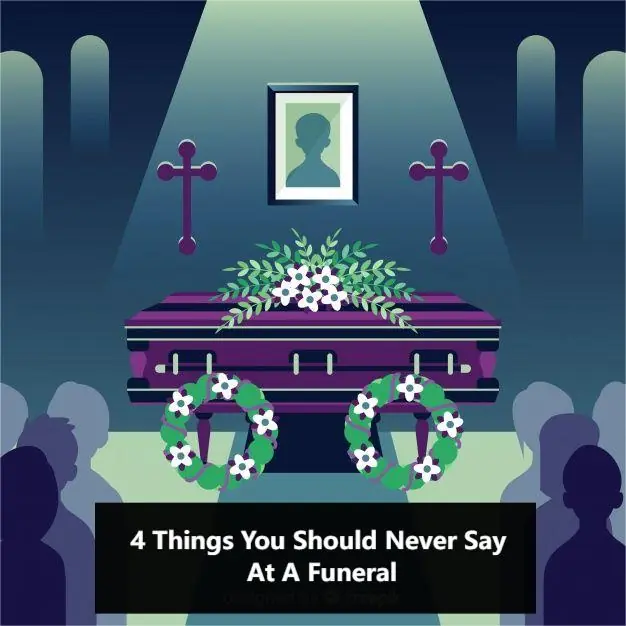
4 Things You Should Never Say at a Funeral — No Matter What
Funerals are deeply emotional occasions marked by grief, reflection, and remembrance. In such moments, our words carry immense weight. Even well-intended phrases can come across as dismissive, hurtful, or inconsiderate to those in mourning.
When offering condolences—whether to a friend, family member, or coworker—it’s important to speak with empathy, sincerity, and caution.
Here are four common phrases to avoid at funerals, and what you can say instead:
1. “They’re in a better place now.”
This phrase is often meant to provide comfort, especially from a spiritual perspective. However, to someone grieving, it may feel like you're minimizing their pain or rushing them to feel better. It implies that they shouldn’t be as heartbroken because their loved one is “better off,” which can unintentionally dismiss the reality of their loss.
What to say instead:
“I’m so sorry for your loss. I’m here if you need anything.”
Simple, heartfelt words of support are often the most meaningful.
2. “At least they lived a long life.”
Grief doesn’t follow a timeline. Whether someone passed at 30 or 90, the pain of loss is real and valid. Saying this may unintentionally suggest that the mourner should feel less sadness because of the deceased’s age, which can feel insensitive or even guilt-inducing.
What to say instead:
“They touched so many lives. I know they meant a lot to you.”
Acknowledge their impact and the depth of the mourner’s relationship without placing limits on their grief.
3. “I know exactly how you feel.”
Even if you’ve experienced a similar loss, grief is deeply personal. No two people feel it the same way. Saying you “know exactly” how someone feels can shift the focus away from them and onto you. It may come across as presumptive or dismissive.
What to say instead:
“I can’t imagine what you’re going through, but I’m here for you.”
This shows empathy and support without making assumptions about their experience.
4. “Everything happens for a reason.”
While this phrase might stem from a place of faith or belief, it can feel cold and philosophical in the face of raw emotion. Trying to assign meaning to someone’s death too soon can sound detached or even offensive to someone still in shock and sorrow.
What to say instead:
“This must be incredibly hard. I’m so sorry.”
Acknowledging their pain without offering explanations shows compassion and respect.
Final Thoughts
At a funeral—or any time you’re offering condolences—your words don’t need to be poetic. They simply need to be genuine and thoughtful. Sometimes, just being present, offering a hug, or listening in silence can speak volumes. In moments of loss, kindness and quiet presence are often more comforting than any carefully chosen phrase.
News in the same category


Junk Cars, Green Future: How Automobiles Became the World’s Most Recycled Consumer Product

France’s Living Streetlights: A Glowing Experiment in Sustainable Urban Lighting

Italy’s Quiet Rubber Roads: A Sustainable Shift Toward Noise-Free, Eco-Friendly Infrastructure

Japan’s Harmony Trains: Blending Innovation and Compassion to Protect Wildlife

Earth Plunged Into Darkness For Six Minutes In Rare Event Not Seen In A Century

NASA Monitors Plane-Sized Asteroid Speeding Toward Earth at 47,000 MPH

Father of 9-year-old Melina Frattolin faces charges as new details surface in her death

🔬 Hidden Lake Beneath Greenland Ice Could Unlock Secrets of Earth—and Beyond

🔬 Scientists Discover Pink Glacial Algae Turning Arctic Snow Red—and Accelerating Ice Melt

7-Eleven Employee Dies After Being Left Brain-Dead in Shocking Incident Involving Manager

Stomach Bug Sickens Over 140 People on Caribbean Cruise, Forcing Passengers and Crew to Isolate in Cabins

🌘 The Longest Total Solar Eclipse of the Century Is Coming — August 2, 2027

🌠 Twin Meteor Showers Set to Illuminate the Night Sky July 29–30, 2025 🌠

The insights your finger length offer about your personality

The Deadly Beauty of Lake Natron: Where Nature Turns to Stone—And Flamingos Call It Home

Milaf Cola: The World’s First Date-Based Soda Could Revolutionize the Soft Drink Industry

Farting Too Much at Night

Check Your Fridge—This Popular Yogurt Brand Was Just Recalled for Plastic Contamination
News Post

Pear and Pomegranate Spinach Salad with Maple-Lemon Mustard Dressing

Creamy Spinach Gnocchi (20-Minute, One-Pan Meal)

Lemon Chicken Orzo Soup

🐱 What Does It Mean When Your Cat Shows You a Mouse?

🍪 Cookies & Cream Swiss Roll Cake

🍪 No-Bake Biscuit Cheesecake Bars

🍓 Strawberry Drip Cake Recipe

🍫 Ultimate Chocolate Milkshake Recipe

Experts Are Shedding Light on the ‘Death Rattle’ Phenomenon Before Passing

Junk Cars, Green Future: How Automobiles Became the World’s Most Recycled Consumer Product

France’s Living Streetlights: A Glowing Experiment in Sustainable Urban Lighting

Italy’s Quiet Rubber Roads: A Sustainable Shift Toward Noise-Free, Eco-Friendly Infrastructure

Japan’s Harmony Trains: Blending Innovation and Compassion to Protect Wildlife

12 Warning Signs Your Blood Sugar Might Be Too Low

Why Do Some People Feel Sad After Eating White Bread?

Discover the Powers of Moringa: Traditional Recipes and Health Benefits

Benefits of Clove Tea: How to Transform Your Health One Cup at a Time

Benefits of Radishes, Ginger, and Honey for Thyroid and Gallbladder Health

Why Do Couples Start Sleeping Separately After Age 50?

